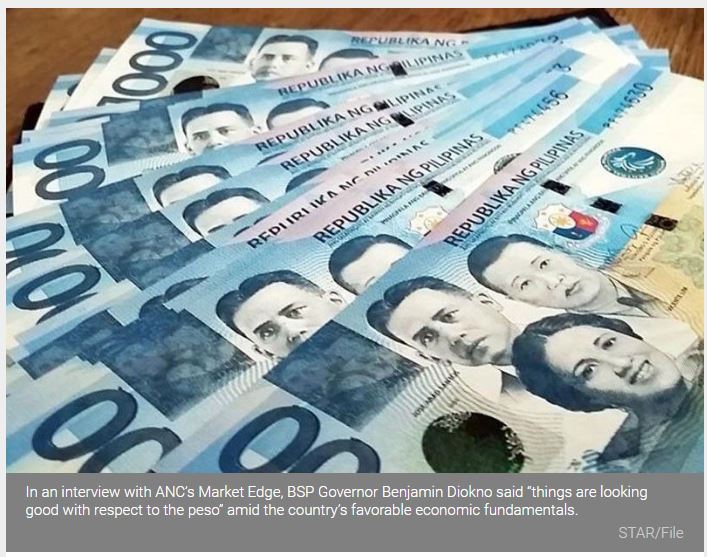Philippines: Peso to remain resilient, says Diokno
MANILA, Philippines — The peso is expected to remain resilient as it continues to emerge as the strongest performing currencies in the region amid the pandemic, according to the Bangko Sentral ng Pilipinas (BSP).
In an interview with ANC’s Market Edge, BSP Governor Benjamin Diokno said “things are looking good with respect to the peso” amid the country’s favorable economic fundamentals.
“We expect the peso to remain resilient as it continued to focus on the Philippines’ macroeconomic fundamentals,” he said.
The local currency emerged as the strongest currency in the region, gaining more than four percent as it continued to trade within the 48 to $1 level.
Diokno attributed the strength of the peso to the benign inflation environment, strong and resilient banking system, low debt-to-gross domestic product (GDP) ratio and record high gross international reserve (GIR).
The Monetary Board revised downwards its inflation forecasts to 2.6 percent for this year.
Diokno said the country’s foreign exchange buffer is seen breaching the $100 billion level after reaching $98.95 billion in end-August, equivalent to nine months’ worth of imports of goods and payments of services and 7.6 times the country’s short-term external debt.
Diokno earlier said that he was comfortable at a range of 48.60 or 48.70 to $1.
“But who knows, maybe there will be a huge influx because of the Christmas season. As you know Filipinos are really, truly altruistic. They send more money when their relatives are facing crisis at home,” he said.
Latest data from the BSP showed remittances from overseas Filipino workers (OFWs) slipped by more than two percent in the first seven months after recovering strongly in June and July.
Personal remittance contracted by 2.4 percent to $16.08 billion from January to July compared to $18.66 billion in the same period last year, while cash remittances coursed through banks shrank by 2.4 percent to $16.8 billion from $17.22 billion.
Remittances, accounting for about eight percent of the country’s GDP, are expected to contract by five percent this year.
Diokno also cited the strong foreign direct investments (FDIs) inflow as the country remains resilient amid the global health crisis.
“Things are turning really rosy with respect to FDIs and also with respect to remittances,” Diokno said.
Net FDI inflow dropped for the second straight year to $9.8 billion in 2018 and $7.65 billion in 2019 after hitting a record $10.3 billion in 2017.
The BSP sees FDIs dropping by 46.4 percent to $4.1 billion this year.
Source: https://www.philstar.com/business/2020/10/06/2047381/peso-remain-resilient-says-diokno


 English
English




